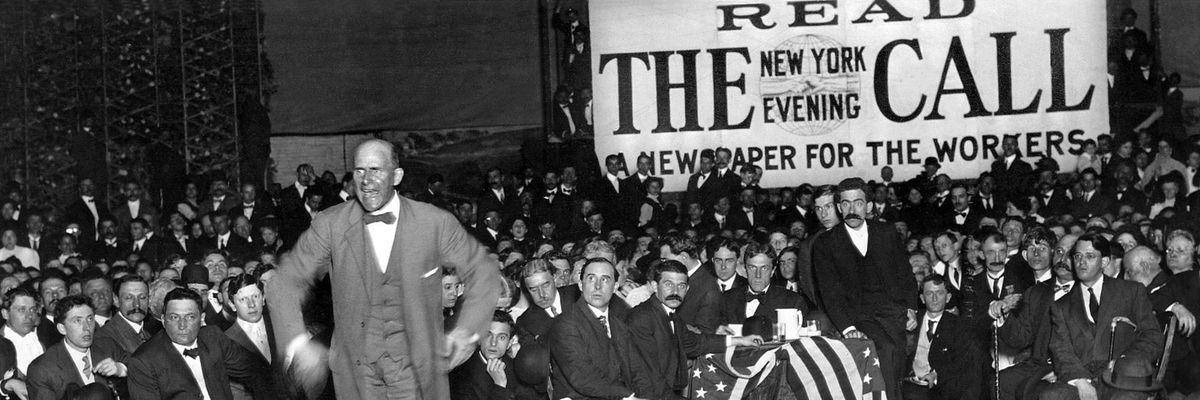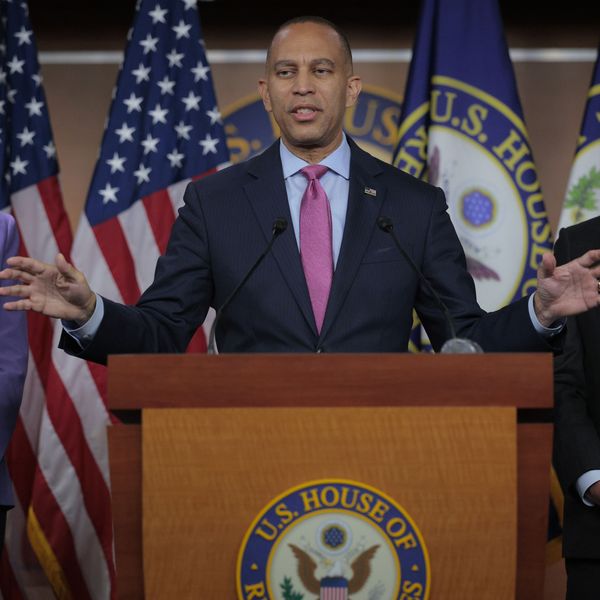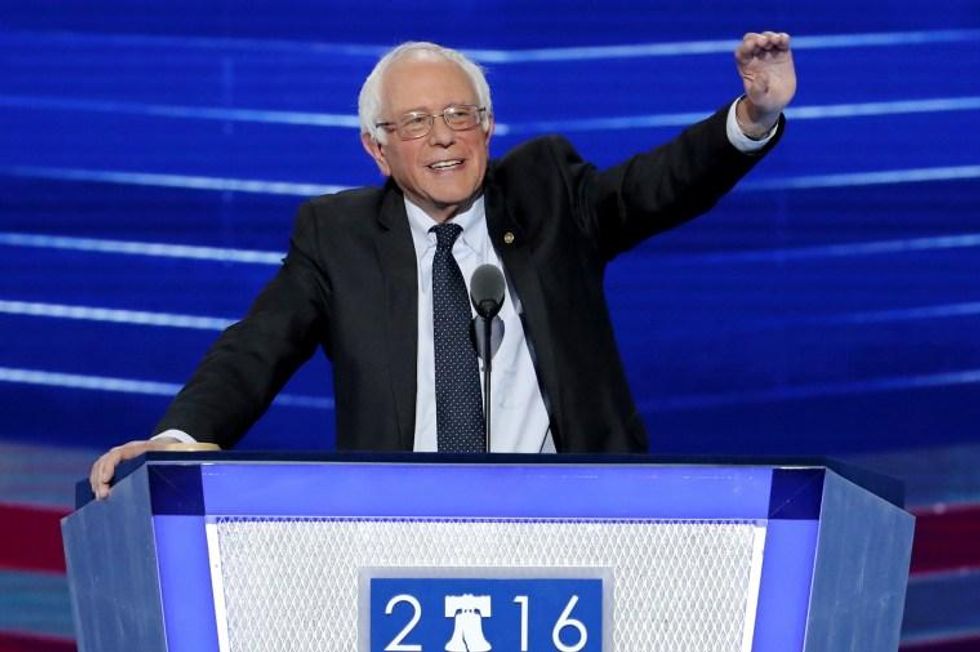
Democrats Ignore the Left at Their Peril. Midwesterners Aren't Scared of Socialism -- They're Hungry For It
Some members of the Democratic establishment argue that bold, left-wing platforms can't win elections. They're wrong
In a recent interview on CNN, Sen. Tammy Duckworth, D-Ill., claimed that candidates who push policies "too far to the left" won't be able to win in Midwestern states. It's an idea that many Democrats have returned to in the wake of surprises like democratic socialist Alexandria Ocasio-Cortez's New York primary victory in June. The theory is that more bold, left-wing ideas might appeal to some voters on the coasts, but average folks in the heartland aren't interested in scary ideas like socialism.
While this argument may comfort mainstream liberals, it's not one that reflects the history -- or the present -- of socialism in the Midwest.
The theory is that more bold left-wing ideas might appeal to some voters on the coasts, but average folks in the heartland aren't interested in scary ideas like socialism.
From the workers' struggles in the 19th and 20th centuries that won the eight-hour workday to the growth of a fighting labor movement to my own election as a millennial socialist city council member in Chicago, Midwesterners have consistently backed socialist movements and socialist candidates that reject the political status quo and fight for the working-class values of solidarity and equality.
Indeed, despite what Duckworth or anyone else might think, socialists have a long history in this region. Eugene Debs, whose labor and political activism in the around the turn of the 20th century made him the most important socialist organizer in American history (and one of Bernie Sanders' icons), is from Terre Haute, Indiana. "Sewer socialists" governed Milwaukee and other areas of Wisconsin for decades, including Victor L. Berger, who in 1910 was elected to the House of Representatives -- the same position Ocasio-Cortez is on the verge of winning this November.
Midwestern cities and towns such as Dayton, Ohio, Minneapolis, Minnesota and Flint, Michigan, all have proud socialist backgrounds. "Appeal to Reason," the most widely read socialist publication in U.S. history, was published out on the plains of Girard, Kansas; Oklahoma was a national hotbed for Socialist Party organizing for much of the 20th century's first half.
The Midwest has also been home to militant worker organizing for over a century, from the Haymarket massacre in Chicago that sparked the modern American labor movement as we know it, to the Flint sit-down strikes of the 1936-1937 which upended the U.S. auto industry, to the founding of public-sector unionism out of Wisconsin in the 1950s, to more recent fights like the Chicago Teachers Union's 2012 strike.
Far from being allergic to socialism and class struggle, as Duckworth suggests, the Midwest has always been a region steeped in it -- even leading the way.
This isn't all ancient history, either. In the most recent Democratic presidential primary, Sen. Bernie Sanders -- for whom I was a proud delegate to the Democratic National Convention -- ran an unapologetically left-wing campaign, proudly fighting for popular policies like Medicare for all, a $15 minimum wage and free public college, all while proclaiming himself a "democratic socialist."
Were Midwesterners scared off by his clear embrace of socialist ideas? Far from it. Sanders won primaries throughout the Midwest, in states like Wisconsin, Minnesota, Michigan and Indiana and barely lost in Iowa, Missouri and Illinois.
And look at my own election. I'm a 29-year-old member of the Democratic Socialists of America (DSA) who was elected to the Chicago City Council in 2015. I ran on an unabashed platform of fighting for this city's working class: fully funding public schools, opposing privatization, ending corporate welfare, preserving and expanding affordable housing and reopening shuttered health clinics. And I wasn't afraid to call out the corporate-friendly Democrats who continue to cut vital social services while giving handouts to corporations and the wealthy.
Did this bold political vision make voters skittish? No way. They chose it in a landslide: Sixty-seven percent of voters in the 35th Ward on Chicago's northwest side voted for me.
The same has been true outside of major urban areas as well. Last year, in Rock Island, Illinois, millennial diesel mechanic and democratic socialist Dylan Parker won election to the city council on a broad platform for the many and not the few that included equitable economic development and universal broadband internet access.
I'm a 29-year-old member of the Democratic Socialists of America (DSA) who was elected to the Chicago City Council in 2015. I ran on an unabashed platform of fighting for this city's working class.
Indeed, this hunger for anti-corporate, anti-establishment politics is spreading throughout the Midwest. You can see it in the massive growth of the Democratic Socialists of America -- currently boasting over 44,000 members. Ocasio-Cortez and I are both members of DSA, which has seen chapters spring up everywhere from Indianapolis and Cincinnati to Des Moines, Iowa and Michigan's Upper Peninsula. My own chapter in Chicago now has over 1,500 members.
The Democratic establishment may not want to acknowledge the growing popularity of the party's left flank and its agenda of fighting for real social, racial and economic justice. But if they hope to win, it's time they embrace it. If they don't, we'll take them head-on.
Midwesterners aren't a monolith, demographically or politically, and we're also not scared of bold left-wing policies -- in fact, we're hungry for them. That vision is firmly rooted in the Midwest's past. It's also our future.
An Urgent Message From Our Co-Founder
Dear Common Dreams reader, The U.S. is on a fast track to authoritarianism like nothing I've ever seen. Meanwhile, corporate news outlets are utterly capitulating to Trump, twisting their coverage to avoid drawing his ire while lining up to stuff cash in his pockets. That's why I believe that Common Dreams is doing the best and most consequential reporting that we've ever done. Our small but mighty team is a progressive reporting powerhouse, covering the news every day that the corporate media never will. Our mission has always been simple: To inform. To inspire. And to ignite change for the common good. Now here's the key piece that I want all our readers to understand: None of this would be possible without your financial support. That's not just some fundraising cliche. It's the absolute and literal truth. We don't accept corporate advertising and never will. We don't have a paywall because we don't think people should be blocked from critical news based on their ability to pay. Everything we do is funded by the donations of readers like you. Will you donate now to help power the nonprofit, independent reporting of Common Dreams? Thank you for being a vital member of our community. Together, we can keep independent journalism alive when it’s needed most. - Craig Brown, Co-founder |
In a recent interview on CNN, Sen. Tammy Duckworth, D-Ill., claimed that candidates who push policies "too far to the left" won't be able to win in Midwestern states. It's an idea that many Democrats have returned to in the wake of surprises like democratic socialist Alexandria Ocasio-Cortez's New York primary victory in June. The theory is that more bold, left-wing ideas might appeal to some voters on the coasts, but average folks in the heartland aren't interested in scary ideas like socialism.
While this argument may comfort mainstream liberals, it's not one that reflects the history -- or the present -- of socialism in the Midwest.
The theory is that more bold left-wing ideas might appeal to some voters on the coasts, but average folks in the heartland aren't interested in scary ideas like socialism.
From the workers' struggles in the 19th and 20th centuries that won the eight-hour workday to the growth of a fighting labor movement to my own election as a millennial socialist city council member in Chicago, Midwesterners have consistently backed socialist movements and socialist candidates that reject the political status quo and fight for the working-class values of solidarity and equality.
Indeed, despite what Duckworth or anyone else might think, socialists have a long history in this region. Eugene Debs, whose labor and political activism in the around the turn of the 20th century made him the most important socialist organizer in American history (and one of Bernie Sanders' icons), is from Terre Haute, Indiana. "Sewer socialists" governed Milwaukee and other areas of Wisconsin for decades, including Victor L. Berger, who in 1910 was elected to the House of Representatives -- the same position Ocasio-Cortez is on the verge of winning this November.
Midwestern cities and towns such as Dayton, Ohio, Minneapolis, Minnesota and Flint, Michigan, all have proud socialist backgrounds. "Appeal to Reason," the most widely read socialist publication in U.S. history, was published out on the plains of Girard, Kansas; Oklahoma was a national hotbed for Socialist Party organizing for much of the 20th century's first half.
The Midwest has also been home to militant worker organizing for over a century, from the Haymarket massacre in Chicago that sparked the modern American labor movement as we know it, to the Flint sit-down strikes of the 1936-1937 which upended the U.S. auto industry, to the founding of public-sector unionism out of Wisconsin in the 1950s, to more recent fights like the Chicago Teachers Union's 2012 strike.
Far from being allergic to socialism and class struggle, as Duckworth suggests, the Midwest has always been a region steeped in it -- even leading the way.
This isn't all ancient history, either. In the most recent Democratic presidential primary, Sen. Bernie Sanders -- for whom I was a proud delegate to the Democratic National Convention -- ran an unapologetically left-wing campaign, proudly fighting for popular policies like Medicare for all, a $15 minimum wage and free public college, all while proclaiming himself a "democratic socialist."
Were Midwesterners scared off by his clear embrace of socialist ideas? Far from it. Sanders won primaries throughout the Midwest, in states like Wisconsin, Minnesota, Michigan and Indiana and barely lost in Iowa, Missouri and Illinois.
And look at my own election. I'm a 29-year-old member of the Democratic Socialists of America (DSA) who was elected to the Chicago City Council in 2015. I ran on an unabashed platform of fighting for this city's working class: fully funding public schools, opposing privatization, ending corporate welfare, preserving and expanding affordable housing and reopening shuttered health clinics. And I wasn't afraid to call out the corporate-friendly Democrats who continue to cut vital social services while giving handouts to corporations and the wealthy.
Did this bold political vision make voters skittish? No way. They chose it in a landslide: Sixty-seven percent of voters in the 35th Ward on Chicago's northwest side voted for me.
The same has been true outside of major urban areas as well. Last year, in Rock Island, Illinois, millennial diesel mechanic and democratic socialist Dylan Parker won election to the city council on a broad platform for the many and not the few that included equitable economic development and universal broadband internet access.
I'm a 29-year-old member of the Democratic Socialists of America (DSA) who was elected to the Chicago City Council in 2015. I ran on an unabashed platform of fighting for this city's working class.
Indeed, this hunger for anti-corporate, anti-establishment politics is spreading throughout the Midwest. You can see it in the massive growth of the Democratic Socialists of America -- currently boasting over 44,000 members. Ocasio-Cortez and I are both members of DSA, which has seen chapters spring up everywhere from Indianapolis and Cincinnati to Des Moines, Iowa and Michigan's Upper Peninsula. My own chapter in Chicago now has over 1,500 members.
The Democratic establishment may not want to acknowledge the growing popularity of the party's left flank and its agenda of fighting for real social, racial and economic justice. But if they hope to win, it's time they embrace it. If they don't, we'll take them head-on.
Midwesterners aren't a monolith, demographically or politically, and we're also not scared of bold left-wing policies -- in fact, we're hungry for them. That vision is firmly rooted in the Midwest's past. It's also our future.
In a recent interview on CNN, Sen. Tammy Duckworth, D-Ill., claimed that candidates who push policies "too far to the left" won't be able to win in Midwestern states. It's an idea that many Democrats have returned to in the wake of surprises like democratic socialist Alexandria Ocasio-Cortez's New York primary victory in June. The theory is that more bold, left-wing ideas might appeal to some voters on the coasts, but average folks in the heartland aren't interested in scary ideas like socialism.
While this argument may comfort mainstream liberals, it's not one that reflects the history -- or the present -- of socialism in the Midwest.
The theory is that more bold left-wing ideas might appeal to some voters on the coasts, but average folks in the heartland aren't interested in scary ideas like socialism.
From the workers' struggles in the 19th and 20th centuries that won the eight-hour workday to the growth of a fighting labor movement to my own election as a millennial socialist city council member in Chicago, Midwesterners have consistently backed socialist movements and socialist candidates that reject the political status quo and fight for the working-class values of solidarity and equality.
Indeed, despite what Duckworth or anyone else might think, socialists have a long history in this region. Eugene Debs, whose labor and political activism in the around the turn of the 20th century made him the most important socialist organizer in American history (and one of Bernie Sanders' icons), is from Terre Haute, Indiana. "Sewer socialists" governed Milwaukee and other areas of Wisconsin for decades, including Victor L. Berger, who in 1910 was elected to the House of Representatives -- the same position Ocasio-Cortez is on the verge of winning this November.
Midwestern cities and towns such as Dayton, Ohio, Minneapolis, Minnesota and Flint, Michigan, all have proud socialist backgrounds. "Appeal to Reason," the most widely read socialist publication in U.S. history, was published out on the plains of Girard, Kansas; Oklahoma was a national hotbed for Socialist Party organizing for much of the 20th century's first half.
The Midwest has also been home to militant worker organizing for over a century, from the Haymarket massacre in Chicago that sparked the modern American labor movement as we know it, to the Flint sit-down strikes of the 1936-1937 which upended the U.S. auto industry, to the founding of public-sector unionism out of Wisconsin in the 1950s, to more recent fights like the Chicago Teachers Union's 2012 strike.
Far from being allergic to socialism and class struggle, as Duckworth suggests, the Midwest has always been a region steeped in it -- even leading the way.
This isn't all ancient history, either. In the most recent Democratic presidential primary, Sen. Bernie Sanders -- for whom I was a proud delegate to the Democratic National Convention -- ran an unapologetically left-wing campaign, proudly fighting for popular policies like Medicare for all, a $15 minimum wage and free public college, all while proclaiming himself a "democratic socialist."
Were Midwesterners scared off by his clear embrace of socialist ideas? Far from it. Sanders won primaries throughout the Midwest, in states like Wisconsin, Minnesota, Michigan and Indiana and barely lost in Iowa, Missouri and Illinois.
And look at my own election. I'm a 29-year-old member of the Democratic Socialists of America (DSA) who was elected to the Chicago City Council in 2015. I ran on an unabashed platform of fighting for this city's working class: fully funding public schools, opposing privatization, ending corporate welfare, preserving and expanding affordable housing and reopening shuttered health clinics. And I wasn't afraid to call out the corporate-friendly Democrats who continue to cut vital social services while giving handouts to corporations and the wealthy.
Did this bold political vision make voters skittish? No way. They chose it in a landslide: Sixty-seven percent of voters in the 35th Ward on Chicago's northwest side voted for me.
The same has been true outside of major urban areas as well. Last year, in Rock Island, Illinois, millennial diesel mechanic and democratic socialist Dylan Parker won election to the city council on a broad platform for the many and not the few that included equitable economic development and universal broadband internet access.
I'm a 29-year-old member of the Democratic Socialists of America (DSA) who was elected to the Chicago City Council in 2015. I ran on an unabashed platform of fighting for this city's working class.
Indeed, this hunger for anti-corporate, anti-establishment politics is spreading throughout the Midwest. You can see it in the massive growth of the Democratic Socialists of America -- currently boasting over 44,000 members. Ocasio-Cortez and I are both members of DSA, which has seen chapters spring up everywhere from Indianapolis and Cincinnati to Des Moines, Iowa and Michigan's Upper Peninsula. My own chapter in Chicago now has over 1,500 members.
The Democratic establishment may not want to acknowledge the growing popularity of the party's left flank and its agenda of fighting for real social, racial and economic justice. But if they hope to win, it's time they embrace it. If they don't, we'll take them head-on.
Midwesterners aren't a monolith, demographically or politically, and we're also not scared of bold left-wing policies -- in fact, we're hungry for them. That vision is firmly rooted in the Midwest's past. It's also our future.


